Key points:
- When the Dallas Cowboys play a home game, worship at The Village United Methodist Church looks much like a tailgate party.
- An offshoot of the more traditional St. Luke Community United Methodist in Dallas, The Village holds its more modern church service to about an hour.
- The approach appears to be working, based on a recent Sunday visit.
Despite being a nationally renowned expert on the Black church, Jason E. Shelton doesn’t ask for any credit for the success of his own church home, The Village United Methodist Church in DeSoto, a suburb of Dallas.
But he can’t help observing with interest, and what he sees is impressive. The Village is an offshoot of St. Luke Community United Methodist Church in Dallas.
“I do believe religion has to modernize, and I think The Village has done a great job of that,” Shelton said. “St. Luke is a big congregation, very historic, very active in the civil rights movement. But what they realized is that some of the people in those pews made it to the middle class. They started to leave Dallas and move south.
“Someone had the bright thought to say, ‘We need to plant a church down there.’”
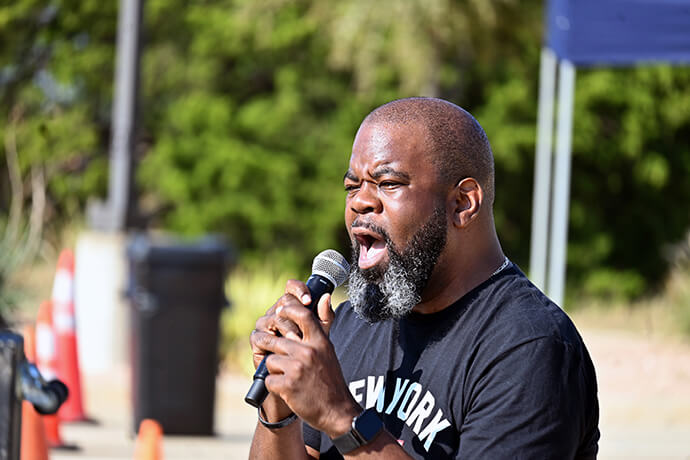
These new suburb-dwelling Black folks have busy lives and growing careers, said Shelton, a sociologist who teaches at the University of Texas, Arlington. His latest book is “The Contemporary Black Church: The New Dynamics of African American Religion.”
“The challenge is we’re living at a time when middle-class African Americans are leaving organized religion, or they’re going nondenominational,” he said. “I think our church, it is Methodist but feels nondenominational.
“We are very contemporary and can pull in people who are looking for a more contemporary feel.”
The Village started worshipping in 2010 in a private home. In 2012, it relocated to its own property in DeSoto.
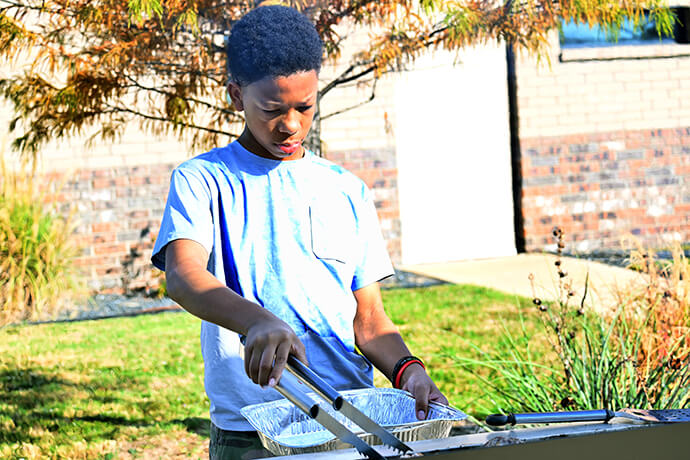
On a recent Dallas Cowboys game day, the church service at The Village had a festive atmosphere much like tailgating at an NFL game. Services were held outside, and burgers and hot dogs were being grilled.
Many of the 200 or so attendees wore the jersey of their favorite team and sat in portable seats watching the action. There was boisterous gospel music, overseen by a DJ behind racks of audio equipment.
“What we’re trying to do is to build a congregation where the good Lord is here, but maybe it doesn’t feel or look like what we’re used to,” Shelton said. “We’ve done a really good job at that, and we’re growing.”
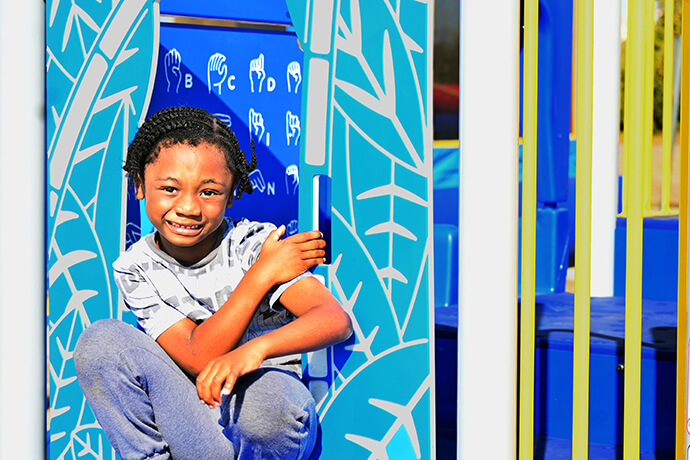
In Shelton’s book, he spells out some of the trends affecting Black churches today. One important point is resistance among many young children — and others — to dress formally in church.
“The 12-year-old boy doesn’t want to wear the suit,” Shelton said. “I’m 48, and I don’t want to wear a suit either, except for Easter Sunday and Mother’s Day and a few other days a year.”
Allowing children (and adults) to dress informally seems to help at The Village, Shelton said.
“How do you build community within the informality?” Shelton said. “There’ll be sermons about growing up in the hood; or there are things that the 12-year-old or 17-year-old, or the 48-year-old or 25-year-old can relate to.”
The energetic sermon that day by Pastor Keith L. Sommerville is a good example.
Sommerville told a story from his youth. He remembered a security guard at a shopping mall detaining him, suspecting him of stealing.
“He saw I had the receipt, and so he let me go,” he said. “I asked the officer, ‘What is it about me that made you decide that I was a thief? Was it because I’m Black? Was it because I’m from a certain neighborhood? What did I do to make you see me as someone that would steal?’”
The policeman gave him an answer. He was a suspect because the officer had observed him hanging out with other kids he knew were stealing.
“Can I help somebody this morning, to tell you the same thing is true right now?” Sommerville said. “Before people get to know you, before they get to know what you’re about, before they understand where you’re from, they’re going to look at the company you keep.”
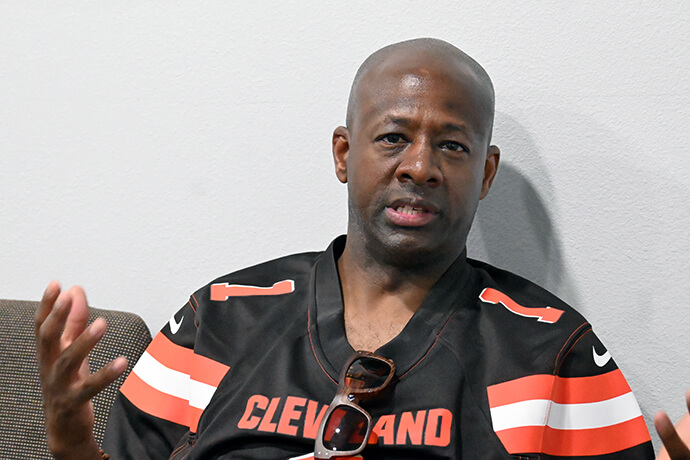
Some Black people consider United Methodist churches to be snobby and out of touch, Shelton said.
The Rev. Derek Jacobs, who founded The Village, partially modeled it on St. John’s Downtown Church in Houston, a United Methodist church co-founded and led by the Rev. Rudy Rasmus, who retired in 2023. Jacobs was on Rasmus’ staff for nine years.
“He taught me that people just desire a safe place to be loved,” Jacobs said. “That was his message, and it connected with me. … People say, ‘church is too judgy; so let’s show them that we’re not. Let’s show them that we’re just like them.”
At St. Luke, the more traditional church, services were often two hours long, and congregants might be at church all day long for various reasons, he said.
“I knew when I started The Village that we’re going to do something completely opposite,” Jacobs said. “We’re going to do a one hour of power, get people in, get people out, and still have a moving and phenomenal worship experience.”
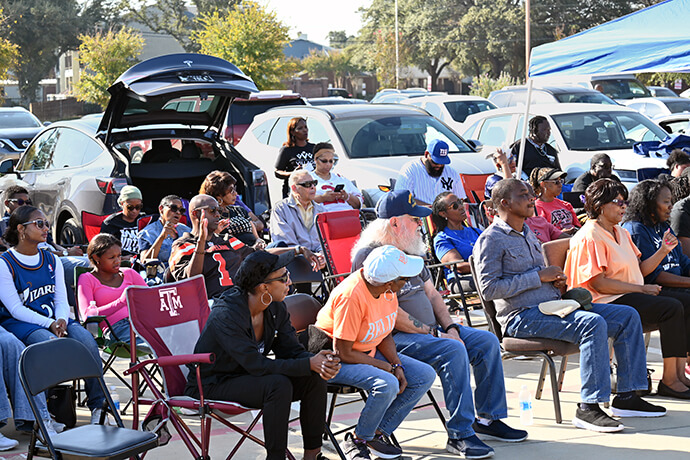
The Rev. Chrischeryl McDaniel began worshipping at The Village in 2012 and recently earned her divinity degree at Perkins School of Theology in Dallas.
“We created our own tradition that emphasizes our history, that emphasizes education, that spotlights challenges of inequality in the United States,” McDaniel said. “To go to a church that does that is really important.
“The Black Methodist tradition has always done that. It has always emphasized how to help people climb out of poverty, how to make life better for people.”
Gwen Johnson, a Village member, said The Village is “down to earth.”
“It deals with everyday situations, and it lets you know that no one is perfect but God; but we are all striving for that. It gives us a goal to reach, but not condemning us on the way.
Subscribe to our
e-newsletter
“You don’t feel out of place. You feel more like a family, and you’re accepted as you are now.”
Leslie Lanig moved with her family to The Village from St. Luke United Methodist. She prefers the smaller church.
“Big churches are wonderful. But this church, we felt that our family could really become part of it,” Lanig said. “We could really serve in ministries that we maybe would not have done in a larger church, because you feel more connected here.”
The emphasis on youth ministries at The Village isn’t a problem for the Rev. Marie Mitchell, a retired United Methodist elder. She served as the interim pastor for 10 weeks when The Village was changing pastors.
“The church was so different in so many ways, so open and so lively,” she said. “The whole experience is not like a traditional Methodist church. So, I guess I felt a sense of freedom here.”
She has made sure church leaders know she is always willing to help, but is also OK with the younger generation providing leadership. Once a month, the youth praise team leads the worship service at The Village, she said.
“In September, they did a segment where they did a little Christian rap, and then gave our pastor an opportunity to rap with them,” she said. “Everybody just fell out.
“Tradition is good,” she added. “We need that. But don’t let it blind us to somebody else’s truth, and how God might be using them.”
Read more: Research reveals new trends among Black Protestants
Patterson is a UM News reporter in Nashville, Tennessee. Contact him at 615-742-5470 or [email protected]. To read more United Methodist news, subscribe to the free UM News Digests.




